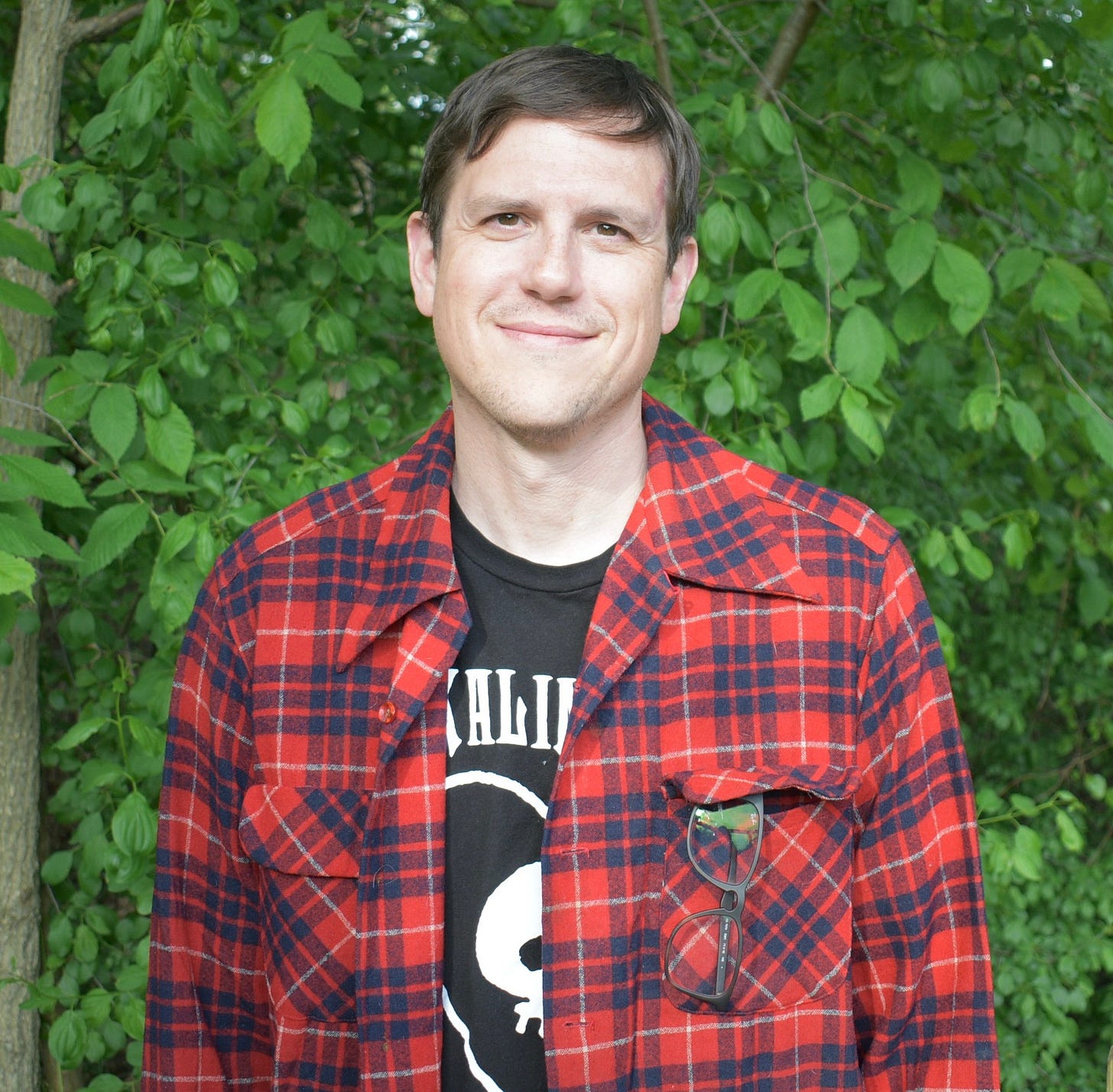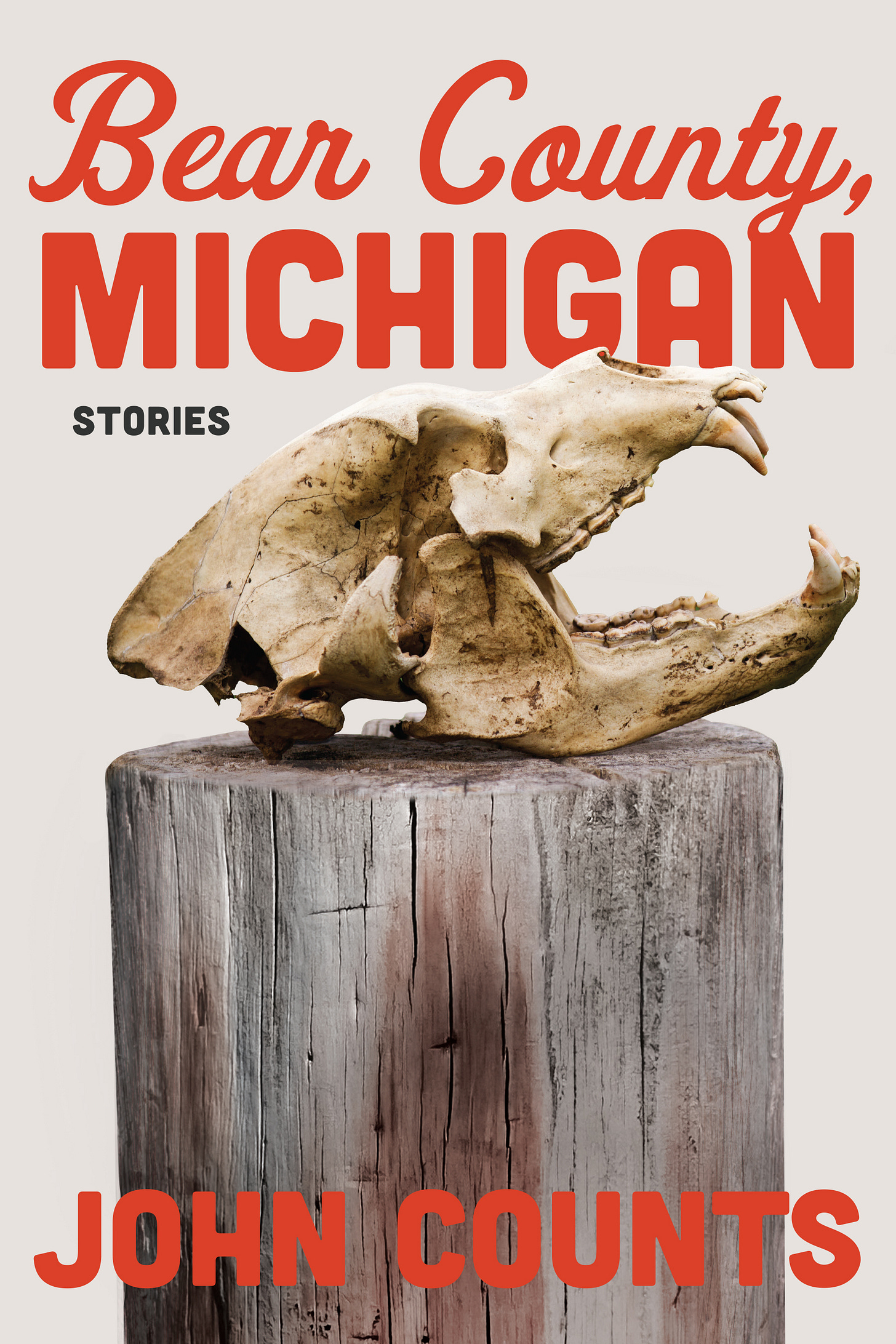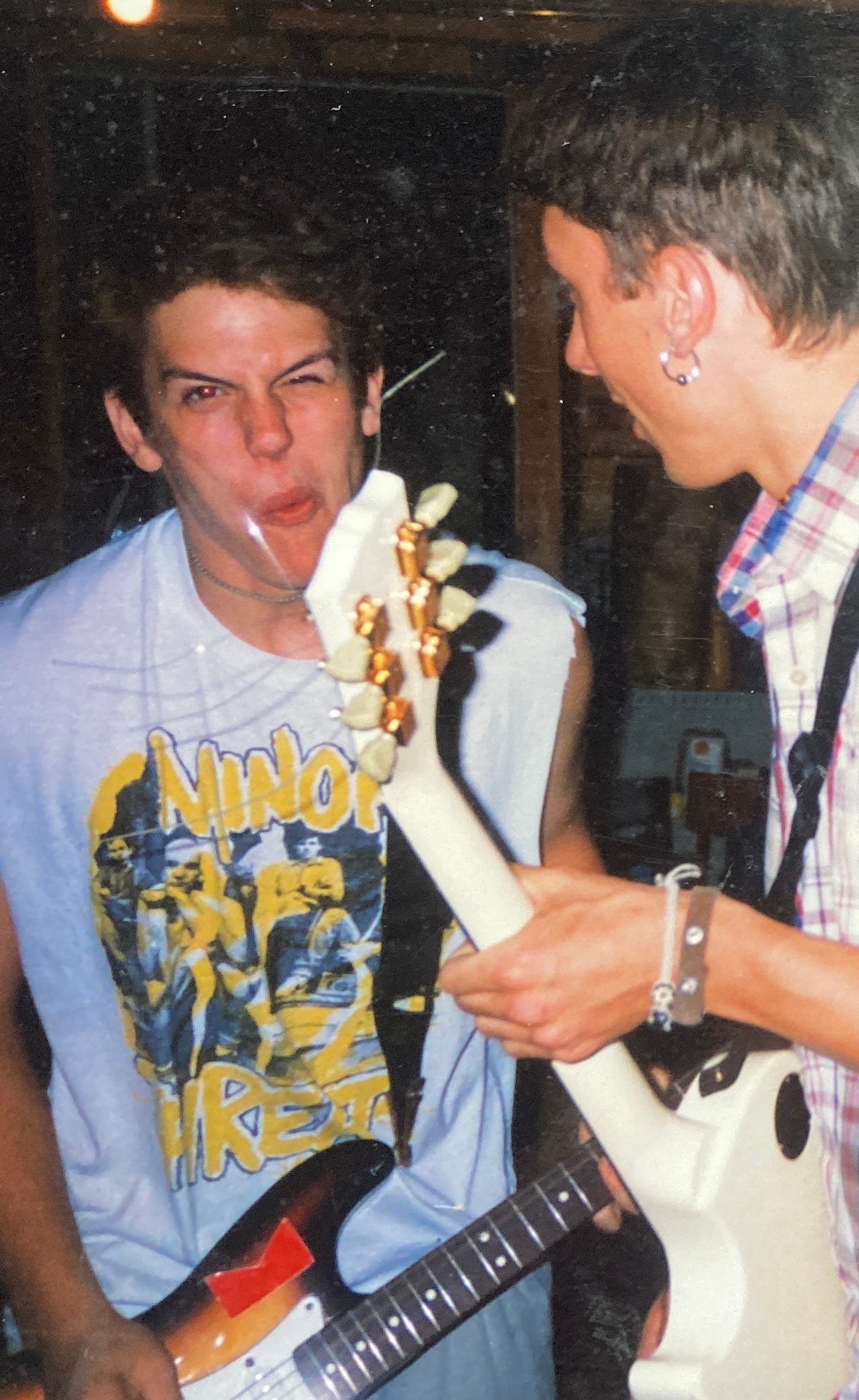This is what it's like when John Counts' worlds collide
The Michigan punk rock and journalism veteran recently published his first book of short stories ... and a companion song-for-story album to go with it.

Speak to writer, journalist and punk rock veteran John Counts about his creative endeavors long enough and things start to run together.
Punk rock characters on the margins of society inhabit his short stories. Crime scenes he’s reported from turn into book details.
It makes sense, then, that the southeast Michigan journalist and investigations editor (full disclosure: I previously worked with John at MLive) would craft a song-for-story album to accompany the release of his first book of short stories, Bear County, Michigan.
As the anthology of 11 short stories and a novella was coming together in 2023, Counts got the itch to bring his two creative worlds together, simultaneously finding the perfect subject matter to use with some of the song structures he had stored up as songwriter for his punk band Suburban Delinquents.
Shortly after TriQuarterly Books/Northwestern University Press published Bear County in February, Counts released Bear County, Michigan: The Album under the moniker John Counts and The Starry Ones. His album is available for free download on Bandcamp. It’s a really fun, folk punk-inspired effort that serves as an enjoyable companion piece to the Hemingway and Jim Harrison-tinged stories that have dark humor and heart, seeking to shine light on those who live differently in the rural parts of northern Michigan.
“They’re like people kind of following their own bliss, even if it doesn't make sense to the rest of the world,” Counts said of the characters inhabiting Bear County, Michigan, which was largely inspired by his early crime reporting days in Manistee, Michigan in the early 2010s.
Recorded with veteran producer Marc Jacob Hudson at Rancho Recordo (Against Me!, Saves the Day, Sunny Day Real Estate) near Holly, the songs on Bear County, Michigan: The Album are a bit of a departure from Counts’ punk rock escapades with Suburban Delinquents, a band he’s fronted since the early 1990s.
Counts’ worlds of punk rock and literary fiction have always been brushing up against each other. Exposed to the great outdoors by his late father, Jeff — a veteran journalist himself — at a young age, his world rocked as a 12-year-old child by Minor Threat and Harrison’s novellas like Brown Dog, in equal measure. His punk rock journey began in his early teens, playing shows in abandoned buildings like the Broderick Tower under different names with mostly the same individuals.
First there was thrash punk band Pee Wee Manson, which featured future Suburban Delinquent bass player Howie Campbell, followed briefly by Grunge Boy, a band nobody can recall the origins of. Next was Roseside Floral, which Counts describes as his attempt at the indie-type of Fugazi punk, but he and the band weren’t able to pull it off.
When Counts, Campbell and drummer Brian Galinda added second guitarist Steve Toth, they Livonia-based band finally settled on Suburban Delinquents, immersing themselves in Screaching Weasel-type punk with Detroit punk and ska contemporaries like the Suicide Machines, Small Brown Bike, The Scholars and the Gutter punx until about 1999. After taking an extended break, the band returned with a renewed focus and its original lineup around 2015, most recently releasing new music in 2024 on a seven-inch with The Black List.
Now living in Whitmore Lake with his wife and two children, Counts will play songs from his Bear County album during a show on Friday, April 18 at The Lexington in Detroit. He’ll be joined by fellow Detroit writers/artists John Freeman and Sean Madigan Hoen, who will all be reading from their work in addition to performing. Counts’ Bear County, Michigan is certainly worth your time can be purchased here.
Radio Amor took some time to Speak with Counts about how his worlds of writing fiction, punk rock and journalism all seem to run together.
Radio Amor: Can you give some background on the process of creating Bear County, Michigan, from conception to publication?
John Counts: I was up working at the Manistee (News Advocate) newspaper. I had just recently finished with grad school in Chicago, like a year earlier, and then I moved back to the Detroit area and worked at a small newspaper in Lake Orion for a year. Then by 2010ish, I was up in Manistee. I still had a hand in the literary world. I was still working on fiction. While I was covering crime for the old News Advocate, I started writing the Bear County stories roughly 2010-11. I kind of worked on a bunch of different stories over the next 10 or so years, and it kind of came together as a collection. I kind of shopped around. It took me a couple years to find a publisher at Northwestern University Press.

RA: How were these stories constructed? Were they influenced by your news coverage as a crime reporter at all?
Counts: It's weird, each story came together differently. Some of them were directly from stuff that I was covering, either up there in Manistee or down here in Washtenaw County, because I worked on them from the time I was in Manistee, and I was continuing to work on them even after I came to Ann Arbor. Some of the stories kind of existed even before Bear County, and they were just kind of hanging out there. The Final Voyage was already a story that was set in northern Michigan, and I just kind of set it aside. Then when I started doing the Bear County stuff, I was like, 'Oh, I'll just set it in Bear County.’ So I rewrote it and now it's set in Bear County. So each story kind of has its own origin story.
There's a couple of events that were directly related to stuff I covered. Like in the story The Hermit, there's a big fire that's based on a fire that I covered up in Manistee County. In Lady of Comfort, there's a big house explosion that was directly based on an event I covered here in Washtenaw County. But otherwise, the tone and the feel and a lot of the details come from looking through police reports and covering all that kind of stuff.
RA: In terms of crafting this album to go along with it, when did that come into play?
Counts: By the time I had enough of the stories to put together into a collection, it was probably around 2015-16, that's when I first started kind of shopping the collection around. Remarkably, the stories are in the order of the way I ordered them, like 10 years ago. Like, nobody's ever moved them around. I've always had Big Frank first and The Standoff was always last. Once I started kind of shopping it around as a full collection, I had all these acoustic songs. I've always got a lot of extra songs that I'm working on that don't necessarily have lyrics. Lyrics are probably the hardest to come by —— the hardest type of writing to do. So I had all these songs, and I was like, 'Oh, well, this is an easy way to find lyrics.’ It's easy to figure out what these songs are about. That was kind of the genesis of it. There's also the sense that ordering a book of short stories is kind of like an album, right? It's kind of like a full length album. Twelve songs,12 stories. So I kind of dug that kind of connection, as well.
RA: How would you compare the relative ease of this project in your mind, to something like a Suburban Delinquents project, in terms of assembling a set of songs to record?
Counts: It felt like a concept album, right? All the music that I was writing - it gave a structure to it. That's phase three or four or whatever of songwriting. First you come up with the riff and the melody and stuff like that. I've got dozens of things like that hanging out there that I just play for fun, or work on, or whenever something occurs to me with the music. But when you finally get to the point where you're like, 'I need to do something with that song,' then you need the structure. The short story collection gave those songs that structure already, and it was already built in. And, you know, it was just kind of a novel idea. I don't know if it has ever been done before.
RA: What were the sessions for recording those songs like once you had the material ready?
Counts: I'd had the songs for many years already, and I kind of had recorded them at home on my own, just to kind of demo them and rough them out. That's when you start finalizing certain aspects of the song, is when you actually commit it to some kind of recording. So, I demoed some of them. Another kind of interesting tidbit is some of the songs are lyrically more directly related to the stories than others. Like, The Nudists - it's just kind of not directly related to the story as much as other songs. Some of the songs that are more directly related to the stories, some of those refer to really old drafts of the story, or things that got cut later (laughs). So, that's kind of weird, but I was like, ‘Do I really need to change the songs?’ I was like, nah, whatever. They're kind of like their own thing.
For the recording sessions, I went up to Rancho Recordo, near Holly, out in the woods there, basically in the woods between Detroit and Flint to go record with Marc Jacob Hudson, who was the sound guy for Against Me! for a long time. He's worked with Save the Day, Cursive and he just remastered the Sunny day Real Estate album, 30, years of Diary. He played bass in one of Laura Jane Grace's side projects for a while. He's a super cool dude. He's got an amazing studio that's filled with books. He's a reader himself and we had done some recording with the (Suburban) Delinquents there. We just heard about him through the grapevine of being in the southeastern Michigan music scene for 30 years. We had such a good experience with him for the Delinquents that we had recorded our latest three songs there for the split seven-inch that we just put out.
While I was there in that session, I was like, ‘Hey, I'm coming out with a book and I need to book some time to record some songs here.’ He was all about it. He thought it was a great idea. I went in there all by myself in December (2023) and just laid down all of the acoustic guitar tracks and the vocals. The songs themselves are kind of folky, singer/songwriter type songs. So, they kind of get built around the guitar and vocals. I had never recorded this way to where the guitar and vocals were first and then I booked another session for many months - I think April 2024 and that's when I had Brian Galindo, who's the Delinquent drummer, and he's also in Touch the Clouds - he came in and laid down some drum tracks and I laid down some bass tracks and did all the extra guitar licks.
RA: What about the publishing situation with the book? Were there complications with producing the songs with the book already published?
Counts: The practical stuff was a little interesting, and it was just something that they had never dealt with before. I kind of introduced a new concept to them, and they were very pleasant about it and very nice about it. I prompted an all hands on deck meeting amongst everybody in the press and me to talk through the various issues that this might cause.
But, basically, it just came down to: They have to give me the permission to do it, because they now have the rights to the stories and you can't produce a derivative of it without their permission. It was a little weird to me, because I've been doing kind of DIY stuff for 30 years and to actually have to think about various rights and stuff like that; it was a new experience for me, but they were nothing but cool about it. At this point, I'm just giving it away for free. The music itself is not really there to make money. It's just there as kind of like an appendage to the book, or a companion piece.
RA: It feels like some of the characters in Bear County lend themselves to the punk rock aesthetic. Do you feel like there are parallels or some crossover between those two worlds? Are those types of characters ones you find yourself gravitating toward?
Counts: I've always been attracted to the scruffy side of the street, I suppose. Most of the characters in the book are kind of marginal; outcasts, substance abuse problems, vaguely criminal. But you know, that's kind of how I grew up, too. I was kind of in a punk rock band for a long time and that's just the kind of people I know. I went straight from being in a punk rock band to covering crime and seeing the types of people I hung out with, but in court.
It was fun to do, and at the end of the day, it was just kind of a celebration for the stories. Just something different to do. I've always been playing music as long as I've also been writing. They kind of blend to me. That makes perfect sense to me, because I'm always doing both of them at the same time.
RA: Why was it important for you to bring those two worlds or sources of creativity in your life together?
Counts: I kind of live in a floating workshop where I've always got lots of little tidbits of ideas and things in development, and, you know, they all kind of merge together in what I do each day. To be able to kind of structure them out into two separate projects that are related. It was kind of an interesting idea and hopefully it is interesting to other people, as well.
RA: Regarding Bear County, I wanted to ask you about Jim Harrison. You’ve talked about witnessing him growing up as a child hanging out with your father. I wondered how he influenced you as a writer? There are certain little moments in these stories that feel indebted to his style.
Counts: When I was growing up, I just thought all writers were as big and famous as he was (laughs). But, I very much grew up in that world of the outdoors and hunting and fishing and seeking out kind of rural, weird places to live, kind of off the beaten trail. When you set out to write fiction, you kind of emulate and imitate what you know best, or what has made you feel deeply about something. His work has always kind of resonated with me. It's kind of the same thing with music. You imitate before you can do it yourself.
His work has always been interesting how it balances this humor about the backwoods, but also, it's got heart, and it kind of shows a tender side of things. That's kind of the same aesthetic that I was going for.




